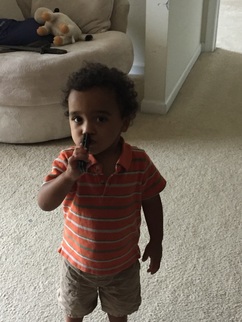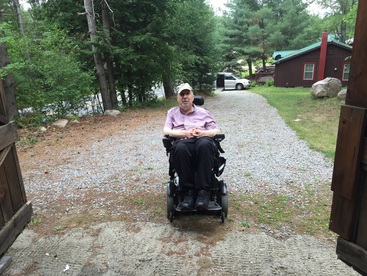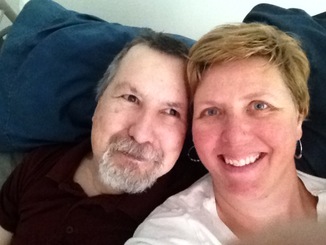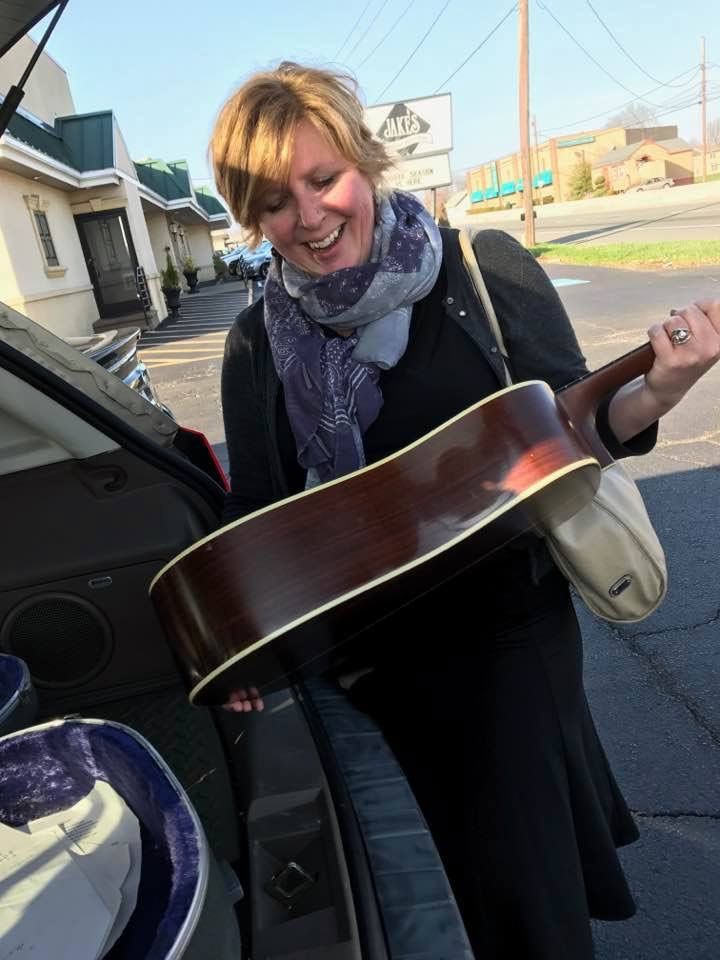 Mateo holding a multi-tool. Mateo holding a multi-tool. My grandson Mateo was helping his Dad, PopPop and Uncle a few days ago by picking up all of the tools on the floor and handing it to someone willing to tell him what the tool was called. Over twenty years ago I moved into a house full of men, who loved me then and still love me today but who use as few words as possible when they are together. It's the most silently active room in the house. They are thinking and grunting and looking at each other and pointing at things and looking at each other again. So much said, so few words uttered. Mateo fits right in. Pick up tool. Look up. Catch an eye. Raise an eyebrow. “That's a hammer.” “Hamur,” Mateo says, mimicking his PopPop. Pick up next tool. Look up. Catch another eye. “Hmm?” “Vice Grip pliers.” “right gip pies,” echoes Mateo. Mateo holds the “pies” for a little bit fiddling with them while the others problem solve the newest furniture addition to my bedroom: a twin hospital bed. And then – click… followed by crying. Mateo had pinched his finger in the pliers. Dan picked him up, rubbed his back and whispered in his ear, “can Daddy see?” Mateo shook his head. “Ok, not yet. It's ok," his dad affirmed him. A few moments later, Dan asked, “You ready to show Daddy?” Still no. Dan continued to affirm, "Ok. ok. ok. Shhh.” It was several times before Mateo was willing to show his dad where the vice grip pliers pinched his finger. Sometimes we're just not ready to let others see where it hurts.  Pete outside my dad and stepmom's new barn in upstate NY. They hope to make it into an accessible "suite" so we can visit. Pete outside my dad and stepmom's new barn in upstate NY. They hope to make it into an accessible "suite" so we can visit. Twelve weeks ago, life “pinched” me and I simply haven't been ready to let others see or hear about my hurt. Throughout the process of accepting and adjusting to my husband's diagnosis with Multiple Sclerosis, I have written about the grief associated with chronic illness. Many of my thoughts are found in these posts that I have fashioned into a memoir that I am looking to publish. While I was putting the memoir together, I stopped writing about the everyday “pinches” that still happen to us. But my silence hasn't been because I've been busy with the memoir. My silence has been like Mateo, I have been unwilling to let others see my hurt. The most recent pinch seems like I need to perhaps start talking about some of the hurt. Pete has had heart disease since I've known him. A heart attack and double bypass surgery was when I first became a Scibienski – sitting beside his sister and brother and mother in the waiting room, staying overnight with Joe in the evenings in what would become my home soon after. Heart disease is managed these days with medication, regular stress tests, stints and defibrillators. Pete's two cardiologists are part of a team of seven professionals who manage Pete's overall health. He sees two because one “is the plumber and one is the electrician,” they say.  Pete and I snuggling on the hospital side of our bed. Pete and I snuggling on the hospital side of our bed. Twelve weeks ago, Pete woke with shortness of breath. It scared him. We called the cardiologist and the plumber told us, “Come into the office today and we'll figure it out.” Adjusted medication, blood work and a return visit revealed that Pete was suffering from Congestive Heart Failure – which is less of a diagnosis and more of a turn in the corner of his already clear diagnosis of heart disease. Turning this corner set off a series of needed changes – some we were ready for, others we were not. Pete has probably had MS for 35-40 years but we learned of it with a difficulty walking 11 years ago. For a couple years, he used a walking stick from time to time. A couple years later, we introduced a walker. Then two years after that, the walker was replaced with a rollator (a walker that can transform into a transport wheelchair.) Then two years later, he began using a motorized wheelchair. This year, we have become the proud owners of a fully automatic hospital bed. When I lay it out like that, it seems structured, calculated, simplistic. It is none of those things. The truth is: each transition is the result of incremental pressure that eventually forces the vice grip pliers of life to pinch us. The last bit of pressure on the pliers was congestive heart failure, but the pressure that led up to it was a progressive loss in Pete's mobility and independence. Pete was needing help more and more moving from chair to bed or to toilet or to shower. Pete was needing help dressing or putting his shoes and socks on. Adjusting my life to these needs has hurt my whole self - mind, body and spirit. These adjustments won't leave a mark. I can't point to the "ouch" anymore. It's been absorbed in my daily routine, in Pete's daily routine. The pressure (at least to the point of vice grip) has been relieved by our team which included my mother bringing dinner each week, cleaning my kitchen and doing my laundry for almost two months. Some of the potential pressure is alleviated by my youngest son helping out more regularly. But like Mateo, when he was ready to show his dad his pinched finger, he blinked his eyes, looked around, pointed to the pliers. He looked up at his dad, raised his eyebrow and his dad said, “Yeah. Pliers. Ouch.”
Mateo shook his head up and down and said, “Pies. Ouch. Yeah.” I hear you Mateo. Chronic illness. Ouch. Yeah. |
Books I'm currently reading:Archives
April 2022
Categories |

 RSS Feed
RSS Feed








